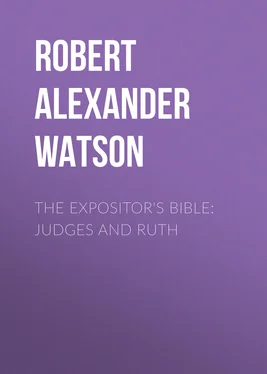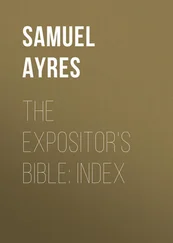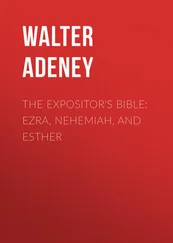Robert Alexander Watson - The Expositor's Bible - Judges and Ruth
Здесь есть возможность читать онлайн «Robert Alexander Watson - The Expositor's Bible - Judges and Ruth» — ознакомительный отрывок электронной книги совершенно бесплатно, а после прочтения отрывка купить полную версию. В некоторых случаях можно слушать аудио, скачать через торрент в формате fb2 и присутствует краткое содержание. Издательство: Иностранный паблик, Жанр: foreign_prose, foreign_religion, Философия, foreign_psychology, foreign_antique, на английском языке. Описание произведения, (предисловие) а так же отзывы посетителей доступны на портале библиотеки ЛибКат.
- Название:The Expositor's Bible: Judges and Ruth
- Автор:
- Издательство:Иностранный паблик
- Жанр:
- Год:неизвестен
- ISBN:нет данных
- Рейтинг книги:5 / 5. Голосов: 1
-
Избранное:Добавить в избранное
- Отзывы:
-
Ваша оценка:
- 100
- 1
- 2
- 3
- 4
- 5
The Expositor's Bible: Judges and Ruth: краткое содержание, описание и аннотация
Предлагаем к чтению аннотацию, описание, краткое содержание или предисловие (зависит от того, что написал сам автор книги «The Expositor's Bible: Judges and Ruth»). Если вы не нашли необходимую информацию о книге — напишите в комментариях, мы постараемся отыскать её.
The Expositor's Bible: Judges and Ruth — читать онлайн ознакомительный отрывок
Ниже представлен текст книги, разбитый по страницам. Система сохранения места последней прочитанной страницы, позволяет с удобством читать онлайн бесплатно книгу «The Expositor's Bible: Judges and Ruth», без необходимости каждый раз заново искать на чём Вы остановились. Поставьте закладку, и сможете в любой момент перейти на страницу, на которой закончили чтение.
Интервал:
Закладка:
The scene at Bochim connects itself very notably with one nine hundred and fifty years later. The poor fragments of the exiled tribes have been gathered again in the land of their fathers. They are rebuilding Jerusalem and the Temple. Ezra has led back a company from Babylon and has brought with him, by the favour of Artaxerxes, no small treasure of silver and gold for the house of God. To his astonishment and grief he hears the old tale of alliance with the inhabitants of the land, intermarriage even of Levites, priests and princes of Israel with women of the Canaanite races. In the new settlement of Palestine the error of the first is repeated. Ezra calls a solemn assembly in the Temple court—"every one that trembles at the words of the God of Israel." Till the evening sacrifice he sits prostrate with grief, his garment rent, his hair torn and dishevelled. Then on his knees before the Lord he spreads forth his hands in prayer. The trespasses of a thousand years afflict him, afflict the faithful. "After all that is come upon us for our evil deeds, shall we again break Thy commandments, and join in affinity with the peoples that do these abominations? wouldest not Thou be angry with us till Thou hadst consumed us so that there should be no remnant nor any to escape?… Behold we are before Thee in our guiltiness; for none can stand before Thee because of this." The impressive lament of Ezra and those who join in his confessions draws together a great congregation, and the people weep very sore.
Nine centuries and a half appear a long time in the history of a nation. What has been gained during the period? Is the weeping at Jerusalem in Ezra's time, like the weeping at Bochim, a mark of no deeper feeling, no keener penitence? Has there been religious advance commensurate with the discipline of suffering, defeat, slaughter and exile, dishonoured kings, a wasted land? Have the prophets not achieved anything? Has not the Temple in its glory, in its desolation, spoken of a Heavenly power, a Divine rule, the sense of which entering the souls of the people has established piety, or at least a habit of separateness from heathen manners and life? It may be hard to distinguish and set forth the gain of those centuries. But it is certain that while the weeping at Bochim was the sign of a fear that soon passed away, the weeping in the Temple court marked a new beginning in Hebrew history. By the strong action of Ezra and Nehemiah the mixed marriages were dissolved, and from that time the Jewish people became, as they never were before, exclusive and separate. Where nature would have led the nation ceased to go. More and more strictly the law was enforced; the age of puritanism began. So, let us say, the sore discipline had its fruit.
And yet it is with a reservation only we can enjoy the success of those reformers who drew the sharp line between Israel and his heathen neighbours, between Jew and Gentile. The vehemence of reaction urged the nation towards another error—Pharisaism. Nothing could be purer, nothing nobler than the desire to make Israel a holy people. But to inspire men with religious zeal and yet preserve them from spiritual pride is always difficult, and in truth those Hebrew reformers did not see the danger. There came to be, in the new development of faith, zeal enough, jealousy enough, for the purity of religion and life, but along with these a contempt for the heathen, a fierce enmity towards the uncircumcised, which made the interval till Christ appeared a time of strife and bloodshed worse than any that had been before. From the beginning the Hebrews were called with a holy calling, and their future was bound up with their faithfulness to it. Their ideal was to be earnest and pure, without bitterness or vainglory; and that is still the ideal of faith. But the Jewish people like ourselves, weak through the flesh, came short of the mark on one side or passed beyond it on the other. During the long period from Joshua to Nehemiah there was too little heat, and then a fire was kindled which burned a sharp narrow path, along which the life of Israel has gone with ever-lessening spiritual force. The unfulfilled ideal still waits, the unique destiny of this people of God still bears them on.
Bochim is a symbol. There the people wept for a transgression but half understood and a peril they could not rightly dread. There was genuine sorrow, there was genuine alarm. But it was the prophetic word, not personal experience, that moved the assembly. And as at Florence, when Savonarola's word, shaking with alarm a people who had no vision of holiness, left them morally weaker as it fell into silence, so the weeping at Bochim passed like a tempest that has bowed and broken the forest trees. The chiefs of Israel returned to their settlements with a new sense of duty and peril; but Canaanite civilization had attractions, Canaanite women a refinement which captivated the heart. And the civilization, the refinement, were associated with idolatry. The myths of Canaan, the poetry of Tammuz and Astarte, were fascinating and seductive. We wonder not that the pure faith of God was corrupted, but that it survived. In Egypt the heathen worship was in a foreign tongue, but in Canaan the stories of the gods were whispered to Israelites in a language they knew, by their own kith and kin. In many a home among the mountains of Ephraim or the skirts of Lebanon the pagan wife, with her superstitious fears, her dread of the anger of this god or that goddess, wrought so on the mind of the Jewish husband that he began to feel her dread and then to permit and share her sacrifices. Thus idolatry invaded Israel, and the long and weary struggle between truth and falsehood began.
We have spoken of Bochim as a symbol, and to us it may be the symbol of this, that the very thing which men put from them in horror and with tears, seeing the evil, the danger of it, does often insinuate itself into their lives. The messenger is heard, and while he speaks how near God is, how awful is the sense of His being! A thrill of keen feeling passes from soul to soul. There are some in the gathering who have more spiritual insight than the rest, and their presence raises the heat of emotion. But the moment of revelation and of fervour passes, the company breaks up, and very soon those who have won no vision of holiness, who have only feared as they entered into the cloud, are in the common world again. The finer strings of the soul were made to thrill, the conscience was touched; but if the will has not been braced, if the man's reason and resoluteness are not engaged by a new conception of life, the earthly will resume control and God will be less known than before. So there are many cast down to-day, crying to God in trouble of soul for evil done or evil which they are tempted to do, who to-morrow among the Canaanites will see things in another light. A man cannot be a recluse. He must mingle in business and in society with those who deride the thoughts that have moved him and laugh at his seriousness. The impulse to something better soon exhausts itself in this cold atmosphere. He turns upon his own emotion with contempt. The words that came with Divine urgency, the man whose face was like that of an angel of God, are already subjects of uneasy jesting, will soon be thrust from memory. Over the interlude of superficial anxiety the mind goes back to its old haunts, its old plans and cravings. The religious teacher, while he is often in no way responsible for this sad recoil, should yet be ever on his guard against the risk of weakening the moral fibre, of leaving men as Christ never left them, flaccid and infirm.
Again, there are cases that belong not to the history of a day, but to the history of a life. One may say, when he hears the strangely tempting voices that whisper in the twilight streets, "Am I a dog that from the holy traditions of my people and country I should fall away to these?" At first he flies the distasteful entreaty of the new nature-cult, its fleshly art and song, its nefarious science. But the voices are persistent. It is the perfecting of man and woman to which they invite. It is not vice but freedom, brightness, life and the courage to enjoy it they cunningly propose. There is not much of sweetness; the voices rise, they become stringent and overbearing. If the man would not be a fool, would not lose the good of the age into which he is born, he will be done with unnatural restraints, the bondage of purity. Thus entreaty passes into mastery. Here is truth; there also seems to be fact. Little by little the subtle argument is so advanced that the degradation once feared is no longer to be seen. It is progress now; it is full development, the assertion of power and privilege, that the soul anticipates. How fatal is the lure, how treacherous the vision, the man discovers when he has parted with that which even through deepest penitence he may never regain. People are denying, and it has to be reasserted that there is a covenant which the soul of man has to keep with God. The thought is "archaic," and they would banish it. But it stands the great reality for man; and to keep that covenant in the grace of the Divine Spirit, in the love of the holiest, in the sacred manliness learned of Christ, is the only way to the broad daylight and the free summits of life. How can nature be a saviour? The suggestion is childish. Nature, as we all know, allows the hypocrite, the swindler, the traitor, as well as the brave, honest man, the pure, sweet woman. Is it said that man has a covenant with nature? On the temporal and prudential side of his activities that is true. He has relations with nature which must be apprehended, must be wisely realised. But the spiritual kingdom to which he belongs requires a wider outlook, loftier aims and hopes. The efforts demanded by nature have to be brought into harmony with those diviner aspirations. Man is bound to be prudent, brave, wise for eternity. He is warned of his own sin and urged to fly from it. This is the covenant with God which is wrought into the very constitution of his moral being.
Читать дальшеИнтервал:
Закладка:
Похожие книги на «The Expositor's Bible: Judges and Ruth»
Представляем Вашему вниманию похожие книги на «The Expositor's Bible: Judges and Ruth» списком для выбора. Мы отобрали схожую по названию и смыслу литературу в надежде предоставить читателям больше вариантов отыскать новые, интересные, ещё непрочитанные произведения.
Обсуждение, отзывы о книге «The Expositor's Bible: Judges and Ruth» и просто собственные мнения читателей. Оставьте ваши комментарии, напишите, что Вы думаете о произведении, его смысле или главных героях. Укажите что конкретно понравилось, а что нет, и почему Вы так считаете.












